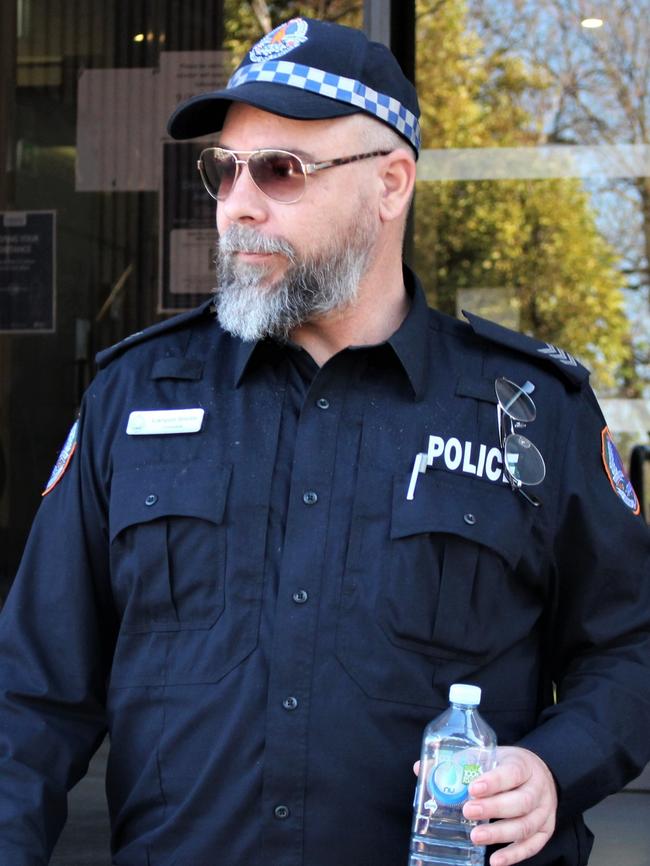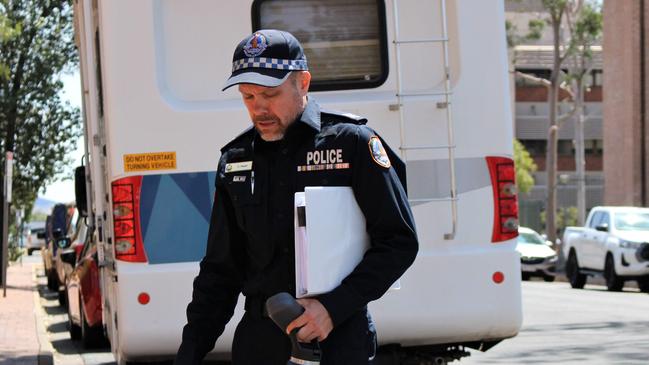Kumanjayi Walker inquest hears Yuendumu elders concerned to discipline kids for fear of intervention, ‘tribal payback’
A police officer with years of experience working in Yuendumu says elders “feel a bit powerless” to discipline kids for fear of reprisal.
Police & Courts
Don't miss out on the headlines from Police & Courts. Followed categories will be added to My News.
Elders in Yuendumu “feel a bit powerless” to discipline their children for fear of intervention by child protection services or reprisals from other families, an ongoing Coronial inquest has heard.
Monday marked the start of the third week of the inquiry in the Alice Springs Local Court into the death of 19-year-old Warlpiri man Kumanjayi Walker, who was killed during a bungled arrest in Yuendumu in 2019.
Remote Sergeant Lanyon Smith was one of two police officers confronted by an axe-wielding Mr Walker three days before his death and the court previously heard it was the penultimate encounter in a series of clashes with the law.
In giving evidence on Monday, Sergeant Smith told the court of a community meeting in Yuendumu where “the kids were lined up and they were smacked”.

But Sergeant Smith said after a complaint was made “for abuse of children”, the elders felt “the government took away the power to discipline their children” during the Commonwealth government’s NT Intervention.
“I’ve been to a meeting where the community – it was in Yuendumu – and there was a break in to both the shops, which were closed and the community had had enough,” he said.
“I never attended the meeting but I was in community at the time and the kids were lined up and they were smacked – for (want of) a better word – by their parents or responsible adult and in that particular case a complaint came out of it from (the Warlpiri Youth Development Aboriginal Corporation), I believe for abuse of children.”
Counsel assisting the Coroner, Patrick Coleridge, asked Sergeant Smith whether community elders no longer felt able to discipline their own children “for fear of intervention by Territory Families”.
Sergeant Smith said he had heard that that was the case and that “a lot of the conversation revolves back to the Intervention”.
“They said the government took away the power to discipline their children,” he said.
“(But) the intervention didn’t actually stop that, you can still discipline your child and it doesn’t have to be in a physical way, it can be as simple as taking, grounding the kids, for lack of a better word.”
Sergeant Smith said the child abuse complaint was passed up the chain of command but no action was ultimately taken against the adults involved.
“I believe it went through, it might have been a ministerial, if not a direct complaint to police and the superintendent at the time, which was Jodi Nobbs, dealt with it,” he said.
“There was no action required from police and without seeing what was written back to the complainant, it was treated as just normal parental discipline. So none of the youth attended the clinic for injuries.”
Sergeant Chris Hand, who was with Sergeant Smith during the axe incident, told the court that during his experience policing in Yuendumu, dating back to the mid 1990s, “physical punishment” was previously a part of how locals “dealt with misbehaving children”.
Sergeant Hand agreed with Mr Coleridge that physical correction of a child “within limits” was lawful in the NT and said the practice in Yuendumu “was a mixture of the punishment, but also shame”.
“They didn’t like to be shamed with the other families and it brought shame to their family because every time there was a break-in at the shop, for instance, they’d close the shop,” he said.
“The elders would round up the offenders and parade them in front of the community, get them to clean up the mess they’d made and shame them into hopefully not committing further offences.”
Sergeant Smith said while only some of the children cleaned up their act as a result, times had changed and there was now “a different way of dealing with it”.
“Sometimes they feel like they can’t discipline the children because then their families, their parents, will get upset, and community fighting starts because they feel like their kids are being picked on by the elders from another family group, so I think they feel a bit powerless,” he said.
Sergeant Hand said there was also “tribal payback” involving adults which “was prevalent in the ‘90s as well and still is today”.

“We tried to keep away from, especially the tribal payback, because that can become problematic with us being seen to condone assaults but it was one of those things where it was going to happen regardless,” he said.
“I know the clinic were front and centre with making sure that no one was seriously injured, but from a police perspective, we couldn’t be seen to be condoning that, which we don’t.
“But that sort of thing’s been going on for thousands of years, so who are we to stop it from happening when we knew it was going to happen, either out there, or in Alice Springs?”
Sergeant Hand said the amalgamation of local community controlled councils into so-called “super shires” at about the same time as the Intervention had also disempowered elders.
“I think that’s got a lot to do with it but also society, mobile phones and social media, YouTube, TikTok, they’re moving towards what you would call an American-style society in a lot of these communities,” he said.
“It’s moving away from culture, from that traditional culture but you’re right, the elders also probably are feeling a little bit disempowered because they don’t have that local control as well.”
Also on Monday, Sergeant Smith rejected a suggestion of a further inquiry into disarming police in remote communities.
Under questioning by a barrister for some of the local families, Andrew Boe, Sergeant Smith said while he had never been threatened by a gun, he did not accept there was an “extremely low chance of you ever having to draw your Glock in the Yuendumu community”.
“I know community members who lawfully own guns,” he said.
“If a community member has a gun, we need to have guns as well.”
Mr Boe asked Sergeant Smith whether he was aware he could apply to police command for an exemption to carry the Glock for up to 12 months and he said he was not, but accepted some community members were “frightened” by the weapons.
“Do you think there is some use in there being a more detailed inquiry into how police, specifically in communities, might be permitted to not wear guns if all the evidence stacks up, guns being a risk and the desire of the community?” Mr Boe asked.
But Sergeant Smith disagreed.
“As long as it’s part of my uniform, my duty, to perform my duties, I shall always be wearing the accoutrements and that includes a Glock,” he said.
“There’s no merit in examining the question?” Mr Boe asked.
“You can examine the question but even with what I’ve said, I still will carry my Glock,” Sergeant Smith replied.
Constable Zach Rolfe was acquitted on all charges relating to Mr Walker’s death by a Supreme Court jury in March.
The inquest continues.





